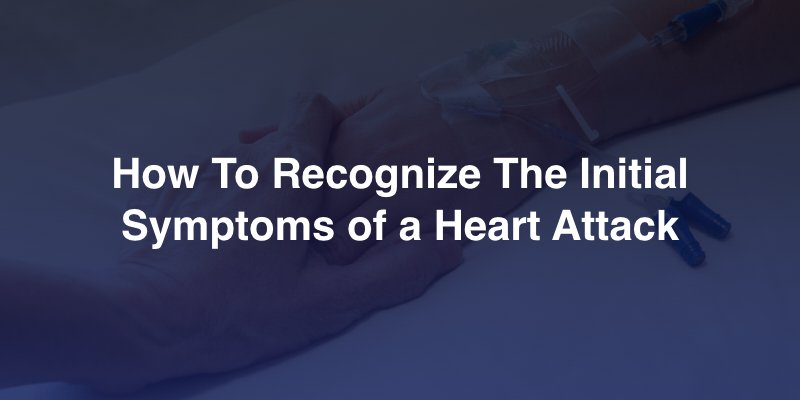
Chest pain or discomfort is not the only sign of a heart attack. In fact, sometimes, chest pain or discomfort are the last symptoms individuals experience when a cardiac event occurs. Individuals and their loved ones must understand the initial signs of a heart attack so they can initiate emergency medical processes quickly. The American Heart Association states that around 90% of all out-of-hospital cardiac arrests each year result in a fatality. Earlier access to CPR can help prevent many of these deaths.
What to Look Out For – If You Notice These Symptoms, Act Now
Recognizing the initial symptoms of a heart attack can help save your life or the life of a loved one. Noticing these initial symptoms quickly and seeking prompt medical care can help significantly improve the expected outcome. Some of these initial symptoms can include:
- Chest discomfort or pain: Often described as a sensation of pressure, fullness, or squeezing in the center or left side of the chest, lasting more than a few minutes or going away and coming back.
- Pain in other parts of upper bodily regions: Symptoms can include pain or discomfort in one or both arms, the back, neck, jaw, or stomach. This pain could range from mild to severe and often feels like a squeezing, fullness, or uncomfortable pressure.
- Shortness of breath: This symptom can occur with or without chest discomfort and is often described as an unexpected difficulty breathing or feeling winded during minimal activity or at rest.
- Cold sweat: Sudden onset of sweating without physical exertion or exposure to high temperatures, often described as a “cold sweat.”
- Nausea or vomiting: A feeling of sickness associated with the urge to vomit, which is not related to food intake or illness.
- Lightheadedness or dizziness: An unsteady feeling that can be accompanied by fainting or feeling faint, often occurring in conjunction with other symptoms.
- Fatigue: Unusual tiredness that cannot be explained by lack of sleep or exertion is often persistent and overwhelming.
We do want to point out that many of these symptoms also have other causes aside from a heart attack. That is one reason why diagnosing a heart attack is so difficult at first. This is also why individuals are often put off seeking medical care after the symptoms arise.
For your health and well-being, and for your peace of mind, if you experience any of these symptoms seek medical care as soon as possible.
Special Considerations for Women
The signs and symptoms of a heart attack in Women are often not the same as the signs and symptoms men experience. Because of this, it is not uncommon for women to experience a misdiagnosis when they exhibit specific symptoms.
- Chest pain is less prominent: While women can experience chest pressure or discomfort, it’s often not the most pronounced symptom. In some cases, chest pain might not be present at all.
- More likely to experience non-chest pain symptoms: Symptoms such as neck, shoulder, upper back, or abdominal discomfort are more common in women. These signs might be misleading and not immediately attributed to a heart attack.
- Shortness of breath without chest discomfort: Women may struggle with breathing difficulties when resting or even while performing everyday activities without feeling chest pain.
- Unexplained fatigue or weakness: Days or even weeks before a heart attack, some women report feeling unusually tired, even after adequate rest. Simple tasks, like walking to the bathroom, can become unexpectedly exhausting.
- Sleep disturbances: Some women have reported trouble sleeping or feeling restless in the nights leading up to a heart attack without a clear reason.
- Anxiety and stress: Women might experience feelings of impending doom or excessive anxiety as a precursor to a heart attack, often disregarding it as stress-related rather than a serious health issue.
- Indigestion, nausea, or vomiting: These symptoms are more frequently reported by women and can be mistaken for flu, stomach ulcers, or other gastrointestinal issues.
Understanding these distinctions is crucial for women and can aid in quicker recognition and response during a heart attack. Women should not dismiss unexplained symptoms, especially if they experience a combination pointing towards a possible heart attack. Please speak with an experienced AED lawyer in Port St. Lucie for legal guidance and support.



